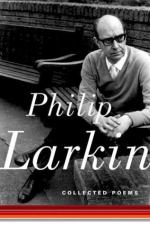|
This section contains 724 words (approx. 2 pages at 400 words per page) |

|
Collected Poems Summary & Study Guide Description
Collected Poems Summary & Study Guide includes comprehensive information and analysis to help you understand the book. This study guide contains the following sections:
This detailed literature summary also contains Topics for Discussion and a Free Quiz on Collected Poems by Philip Larkin.
Philip Larkinappears in All
Philip Larkin (1922 - 1985) was an English novelist, poet, jazz critic, and university librarian. Born in Coventry, in the West Midlands of England, Larkin was schooled at the King Henry VIII School in Coventry. During World War II, Larkin was rejected for service in the military and took the opportunity to attend St John's College at Oxford, to pursue a degree in English language and literature.
Larkin met Kingsley Amis at Oxford, a man who became a lifelong friend and who appears frequently in Larkin's letters. After graduating from Oxford, Larkin went to work as a municipal librarian in Wellington, Shropshire. Larkin went on to become the assistant librarian at University College in Leicester, sub-librarian at Queen's University in Belfast, and then in 1955, the poet became the librarian at the University of Hull, where Larkin remained until his death in 1985.
Larkin's first notable work was "The Less Deceived," published in 1955. The poet also realized success with his next two works, "The Whitsun Weddings" published in 1964, and "High Windows" published in 1974.
Unlike many poets, Larkin received a good deal of notoriety for his work while he was still alive. After the death of the English Poet Laureate John Betjeman, Larkin was presented with the honor but declined, saying that his work was not meaningful enough.
Larkin continues to receive accolades for his work, often referred to as the "greatest poet in the latter half of the twentieth century." In 2003 the Poetry Book Society honored Larkin as "the nation's best-loved poet," and in 2008 Larkin was named as "the greatest post-war writer" by The (London) Times.
Charles Causleyappears in Dear CHARLES, My Muse, Asleep or Dead
Charles Causley (1917-2003) was an English writer and poet from Cornwall. Causley's work is often complimented for its base in Christianity, directness, and many associations with his Cornish heritage. These characteristics plus Causley's use of simplicity is one of the reasons he so heavily influenced other English writers and poets, including Philip Larkin, Seamus Heaney, and Ted Hughes, a writer who was also Causley's closest friend. These men, along with a group of select British poets would later be called upon to publish a book of poems for Causley's 65th birthday as a tribute.
Professionally, Causley started at age sixteen, forced to go to work due to his father's death. Later, Causley joined the Navy and served as a coder in World War II. The poet's first collection of poems was published in 1951 and included a well received poem titled "Song of the Dying Gunner A.A.1." The next collection was published in 1953 and Causley continued to publish until his death in 2003.
Causley also taught at a school in Launceston in the UK. The poet was rather self- contained and rarely left Launceston although he did so when required. The longest period spent away from home was when Causley was invited, on two occasions, to act as a visiting Fellow at the University of Western Australia in Perth.
Causley's awards include a 1958 Fellowship in the Royal Society of Literature; in 1967, Causley was awarded the Queen's Gold Medal for Poetry; and in 2000, the poet was awarded with the title of Companion of Literature by the Royal Society of Literature.
Sidney Bechetappears in For Sidney Bechet
Sidney Bechet - Jazz saxophone player and idol to Larkin
Arnoldappears in Self's the Man
Arnold - character in "Self's the Man" who has given up all of his personal freedom to care for his family.
C.G.B.appears in He Hears That His Beloved Has Become Engaged
C.G.B. - Man who must learn to come to grips with the fact that his beloved has been engaged to another man.
Franz Kafkaappears in The Literary World
Franz Kafka - German philosopher and author who appears in Part I of "The Literary World."
Mrs. Alfred Tennysonappears in The Literary World
Mrs. Alfred Tennyson - Mrs. Tennyson is featured in Part II of "The Literary World" as one who takes care of everything for her husband so that he may do nothing but write.
Mr. Bleaneyappears in Mr. Bleaney
Mr. Bleaney - Main character in the poem about a man who had rented a flat before Larkin.
Jake Balokowskyappears in Posterity
Jake Balokowsky - Larkin's biographer and educator.
Rosemaryappears in Femmes Damnees
Rosemary - One of the women mentioned in "Femmes Damnees."
Read more from the Study Guide
|
This section contains 724 words (approx. 2 pages at 400 words per page) |

|




